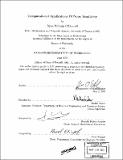Computational applications of noise sensitivity
Author(s)
O'Donnell, Ryan William, 1979-
DownloadFull printable version (6.024Mb)
Other Contributors
Massachusetts Institute of Technology. Dept. of Mathematics.
Advisor
Madhu Sudan.
Terms of use
Metadata
Show full item recordAbstract
This thesis is concerned with the study of the noise sensitivity of boolean functions and its applications in theoretical computer science. Noise sensitivity is defined as follows: Let f be a boolean function and let ... be a parameter. Suppose a uniformly random string x is picked, and y is formed by flipping each bit of x independently with probability e. Then the noise sensitivity of f at e is defined to be the probability that f(x) and f(y) differ. In this thesis we investigate the noise sensitivity of various classes of boolean functions, including majorities and recursive majorities, boolean threshold functions, and monotone functions. Following this we give new complexity-theoretic and algorithmic applications of noise sensitivity: * Regarding computational hardness amplification, we prove a general direct product theorem that tightly characterizes the hardness of a composite function g 9 f in terms of an assumed hardness of f and the noise sensitivity of g. The theorem lets us prove a new result about the hardness on average of NP: If NP is (1 - poly(n))-hard for circuits of polynomial size, then it is in fact (1/2 + o(1))-hard for circuits of polynomial size. * In the field of computational learning theory, we show that any class whose functions have low noise sensitivity is efficiently learnable. Using our noise sensitivity estimates for functions of boolean halfspaces we obtain new polynomial and quasipolynomial time algorithms for learning intersections, thresholds, and other functions of halfspaces. (cont.) From noise sensitivity considerations we also give a polynomial time algorithm for learning polynomial-sized DNFs under the "Random Walk" model; we also give the first algorithm that learns the class of "junta" functions with efficiency better than that of the brute force algorithm. * Finally, we introduce a new collective coin-flipping problem whose study is equivalent to the study of "higher moments" of the noise sensitivity problem. We prove several results about this extension, and find optimal or near-optimal choices for the coin-flipping function for all asymptotic limits of the parameters. Our techniques include a novel application of the reverse Bonami-Beckner inequality.
Description
Thesis (Ph. D.)--Massachusetts Institute of Technology, Dept. of Mathematics, 2003. Includes bibliographical references (p. 161-171).
Date issued
2003Department
Massachusetts Institute of Technology. Department of MathematicsPublisher
Massachusetts Institute of Technology
Keywords
Mathematics.